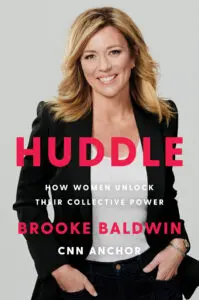I made my way to Capitol Hill in the spring of 2019, after the midterm elections when an unprecedented large crop of women had been elected. The weather was unseasonably warm, and my Lyft driver made small talk about the fact that it was the peak time to see cherry blossoms. I had arranged to meet with a group of newly elected congresswomen: Elaine Luria, Abigail Spanberger, Chrissy Houlahan, Elissa Slotkin, and Mikie Sherrill. They were far outnumbered by the men in Congress, but this huddle of women had years of practice being the minority gender, because they’d all had former careers in the military or CIA. Their schedules that week were so tight that we had to meet at 9:30 p.m. after they’d spent a full day in session.
Once inside the Capitol, I passed through the metal detectors and was met by a young staffer who led me back to a cozy office. The five congresswomen were settled around a coffee table, scooping ice cream into little paper cups, laughing and talking over one another. Congresswoman Slotkin opened a bottle of red wine as they chatted about who had been recruited to the congressional women’s softball team that would meet the next morning for practice. If these women had been plagued by the scarcity mentality all their lives, you wouldn’t know it now. They were dressed like picture-perfect politicians having come from a long day in session, but they were lighthearted with each other, down to earth, even dropping some f-bombs into the conversation. Their group dynamic made me think of sisters who tease each other a lot, or maybe athletes on the same team who know how to cut loose and have fun when the game is over.
I got the sense that there was a lot of mutual relief and exhaling going on when they were in one another’s presence. They’d all spent their lives traveling for work—whether that was a military deployment, a CIA mission, or now the grueling commuting situation required of members of Congress. In the Venn diagram that represents the various quadrants of their lives, they all share a unique overlap not many of us can boast: mother, veteran, and congresswoman.
I kicked off the conversation by asking about their time huddling in their respective military and CIA careers. There was a brief awkward silence, then Luria broke it to me gently: “To be completely honest, I don’t think women in the military bond very well.” Luria should know, given she was the first female American sailor to spend her entire 20-year military career on combat ships. Her kindly-delivered truth bomb deflated the room, and then everyone busted out laughing. There were a lot of jokes about how the military isn’t exactly full of group hugs and nourishing female mentorships.
Slotkin hails from Michigan and decided to serve her country after experiencing 9/11 as a graduate student in New York. She has since served three tours in Iraq. “When I was a baby CIA analyst, serving on war zone accounts, anytime I walked into the room, there was always one senior woman, and she always hated me.”
“Yeah,” Spanberger chimed in, “and not only does she hate you, but she’s going to tell you all the reasons why your marriage will fail. I had women I thought were mentors tell me that if I wanted to have kids, I should probably become a report officer instead.”
Houlahan, who was the oldest of the group at 52, remembered seeing her husband working his way up the ladder in the corporate world and envying the formal mentorship structure he enjoyed. “That never existed in my life—not in any of the sectors I worked in,” she explained.
Slotkin explained that the incoming generation is much different. “In my lifetime, I’ve watched that generation of women who hated each other retire, and now there are more females in national-security leadership roles, and therefore a more positive environment for all.”
Like women in so many other industries who made it to “the top” in the “huddle” drought years, the colleagues Slotkin described were likely made to feel like outliers for achieving their high ranks, which may have made them overly protective of their prized seats at the table. But this scarcity mentality doesn’t originate from innate catfighting among women; it is instead symptomatic of male-dominated environments in which white women in particular take the bait to compete for very slim pickings. It’s hard to use your seniority to sponsor another woman when you’re busy fighting for crumbs yourself.
[Slotkin’s] colleagues were likely made to feel like outliers for achieving their high ranks, which may have made them overly protective of their prized seats.
And yet despite a lack of mentorship or sponsorship experiences, everyone in the group credited the military for perfecting their ability to work as a team. So despite the scarcity mentality they’d endured, these five women were also perhaps better huddlers than many of their civilian counterparts. In one of her campaign ads, Luria showed herself at work aboard a ship, saying, “When this is your office, your only option is to work together. . . . Congress could learn a thing or two at sea.” It’s an unusual message to run on, particularly for a first-time candidate trying to credential herself to voters.

Along these same lines, Slotkin explained the not-so-subtle culture shock she experienced in transitioning from the Pentagon to Congress. Although both jobs are oriented around service to her country, only one of them has involved daily meetings where colleagues constantly pontificate about their own qualifications and contacts. “At the Pentagon, I literally can’t remember a single time when someone talked about themselves and how great they were. It would be grounds for being excused from the mission. But it happens at almost every meeting I attend in Congress,” she said dryly. This ability to keep the team central to all operations may have been responsible for their wide appeal to voters. “In a time when so many issues are instantly politicized and when people of different political persuasions have trouble talking to one another, I think our mission-first focus was very welcomed,” Slotkin reflected.
Knowing about their past experiences, it made sense that a huddle of former military and CIA women would be supremely mission-focused in a way that a deeply divided country found refreshing. (All five kept their seats in the 2020 election.) It also did not come as a shock that after many years in environments without female huddles, they worked together to create this environment where the abundance mentality reigns supreme. The congresswomen were constantly championing each other’s work and thinking through important legislative decisions together. As a matter of survival, they allowed themselves to vent via a highly active text chain they called “the Badasses.” Their camaraderie and practical support of one another was clearly part and parcel of their daily success. There was no whiff of competition, but rather a clear mandate for cooperation and support. They had each other’s backs and were having a lot of fun along the way.
The congresswomen had quickly realized during their 2018 campaigns that their cohesion as a group would inspire more donors and voters than if they campaigned individually. Despite party leaders frowning on this idea, they knew something special happened anytime they’d appear side by side at fundraising events for Serve America—a PAC that supports service-oriented candidates.
“Some of our male colleagues—who we love—would go chapter and verse on what they’ve accomplished. But we would tell the emotional stories of why we were running. Our backgrounds were important, but the stories took center stage,” explained Slotkin.
The power in this, Spanberger explained, was “profoundly noticeable when there’s a line of eight women standing onstage.”
Reflecting on this, Luria posed this question to the group: “Did you guys think this was the first time in your career when being a woman was such an asset?”
“First time ever,” said Spanberger, the others nodding in agreement.
With staffers checking their watches and a security guard coming in to do a head count, we wrapped up our conversation. As I walked back out into the night air, gazing out on the National Mall, I thought about all the speeches, protests, and shouting matches that have taken place there. I scanned the horizon, looking for cherry blossoms and thinking about the so-called pink wave. I couldn’t help noticing that nothing around here was really pink enough just yet. Men have been doing a lot of talking around here, I thought, and it felt good to hear some women speaking for a change.
This article has been adapted from Brooke Baldwin’s book Huddle: How Women Unlock Their Collective Power, which is published by Harper Business, an imprint of HarperCollins Publishers.
Brooke Baldwin is a veteran journalist who you’ve seen on CNN over the last decade covering some of the world’s biggest breaking stories. She is a Peabody Award finalist, and her first book Huddle: How Women Unlock Their Collective Power is a national and Wall Street Journal bestseller.
Recognize your brand’s excellence by applying to this year’s Brands That Matter Awards before the early-rate deadline, May 3.
